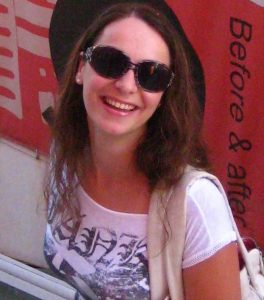Dr. Natasa Tsiaousidou is a general surgeon, a researcher with a PhD in pancreatic cancer and several publications in the fields of cancer and surgery, and a part-time scientific writer. She is originally from Greece and currently lives in Scotland, UK. After being diagnosed with autism a few months ago, she started a blog on autism called theautisticdoctors.com with an aim to address the problems Autistic people often have to deal with at work. When she’s not on clinical duty or writing, she enjoys practicing martial arts, listening to progressive metal music, and reading about cosmology, chance and probabilities, striving ineffectually to make sense of this world.
When did you become aware you are Autistic?
I started suspecting it about a year ago. I was having some work-related communication issues and I was at the time speaking to a counsellor. What actually changed the route of events for me was the light bulb moment I had while I was watching a stand up comedy show on Netflix called Douglas. In the show, the comedian Hannah Gatsby is sharing her own personal stories and experiences of autism diagnosis. After that I did a dozen online autism tests, and they were all suggestive of the condition. I had a lot of doubt though since most of the people I sought help from weren’t convinced until I got an official diagnosis. Sometimes I still feel like an imposter.
Tell me about your blog and what your hopes are for the audience.
I started the blog in order to share my experiences and concerns with others, to perhaps help people in similar situations and most importantly with a hope that I could contribute to raising awareness within such a conservative environment as the NHS here at the UK is. It is also a coming out project for me that helps me deal with all the changes.
An article on your blog mentions some of the potentially positive evolutionary traits of autism and suggests, “Being willing to look beyond the superficial rudeness and the growing tendency to be easily offended, one could discover an unlikely friendship or receive unexpected kindness when open-minded.” Is the tendency for NTs to be easily offended related to pride, not wanting to be talked to a certain way, feelings of superiority, etc. or something else? What do you think if you had to guess?
As an autistic individual, I very often have to guess what others mean when they say certain things, or when they actually say the exact same thing but … in a different way. This is the way the majority of people communicate and us autistic lot try very hard to follow. We should keep in mind, however, that this is not the only way to communicate and just because we are fewer doesn’t mean we don’t make sense or that our ways of interacting should be getting dismissed as ‘inappropriate’ and ‘incorrect’. Outdated social norms might have been useful in the past, but we are constantly evolving as beings and maybe it is time that communicating autistic style becomes more accepted and understood. To be honest it would be a relief for all humanity if everyone just said what they actually meant.
Regarding the question above, how have you learned to navigate social situations with NTs so that they have been more open-minded with different ways of communicating and not gotten “hung up” on what is perceived as rude, direct, or insensitive?
I haven’t really. Still working on it, but if I find the answers be sure that I will immediately post them on my blog to share the truth with the world! There are some tips I have gathered from speaking to other autistic people and I have actually written a blog post on the subject, however the level of their success heavily depends on the individuals involved in each situation.
What unique obstacles/challenges do Autistic doctors face in the workplace?
Working as a doctor can be a challenge for an autistic individual for many reasons. I guess the main issues have to do with the constant alternation of day and night shifts that mess up our circadian rhythms, the sensory issues that are often overlooked in a hospital setting and also the lack of street credibility which does not help at all when you are in a position of authority. One of the major obstacles is how most people perceive a doctor should be in order for them to trust them. It is all about the status: old, male, serious, absolute and conservative. I don’t tick any of these boxes and I don’t think that a good doctor should have to.
What unique benefits do Autistic doctors have to offer their patients (Autistic or NT)?
Autistic doctors are meticulous, persistent, focused and passionate about what they are doing. The need to search for the truth and their extraordinary persistence make them very good at diagnosing diseases and solving problems using their creative style of thinking.
What are some ways hospitals/doctors offices/healthcare providers can be more inclusive?
I think the number one problem we need to tackle is the lack of awareness. There are so many clinical practitioners in the NHS, and I am sure in all the other first world country health systems, that don’t really have a clue what autism is. I personally had problems getting referred for a diagnosis because my doctor felt that it could be harmful for me and my career to get ‘stigmatised’ as an autistic doctor. This is the kind of prejudice we need to eliminate from our healthcare systems and the society in general.
The world has to understand that autistic brains have been driving human progress and advances probably since the beginning of our time on earth and they will continue to, so why not try to support them instead of becoming the obstacle?

